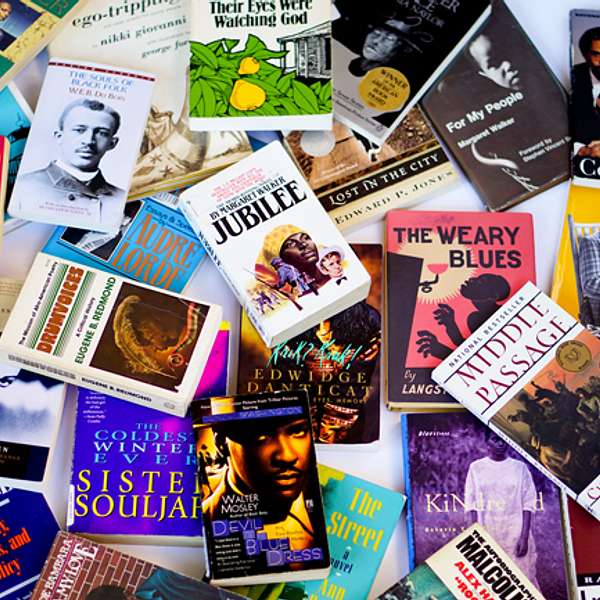
Remarkable Receptions
A podcast about popular and critical responses to African American novels, artistic productions, and more.
Remarkable Receptions
Wayetu Moore’s She Would Be King -- ep. by Ebony Lumumba
A short take on Wayetu Moore's debut novel about a redheaded Black woman with supernatural powers.
Written by Ebony Lumumba.
Read by Kassandra Timm
In the close of her 2018 debut novel She Would Be King, Liberian-American author Wayetu Moore writes her main character—Gbessa (pronounced Bessa)—a redheaded Black woman with supernatural powers—leading an all-male regiment into battle against imperialist forces. Her power was living. No matter how many moments and people try to end her life, Gbessa lives. She cannot die. As she collapses to the sand, she says aloud, “We will not die” (294).
You’re listening to Remarkable Receptions—a podcast about popular and critical responses to African American novels.
Moore’s She Would Be King revises the history of Liberia through three characters -- Gbessa, June Dey, and Norman Aragon -- who all possess African heritage and supernatural abilities. The three remarkable characters band together like a Black Justice League to rescue African people from being kidnapped in the Transatlantic Slave Trade. Moore’s writing imagines heroes of diverse African lineages rescuing the fate of stolen Africans—crafting a narrative where Black people rescue themselves from the treachery of racism. While all three heroes possess powerful supernatural capabilities, it is the lone female, Gbessa, who stands out for her mental, spiritual, and mystic ability to not die. She “would be king” were she not a woman. Her life is a metaphor for the African Diaspora. Despite violent marginalization and oppression at the hands of white supremacy, like Gbessa, Black people survive.
She Would Be King elegantly represents various fundamental tenets of afrofuturistic expressions. First used by Mark Dery in a 1994 essay titled “Black to the Future,” the term afrofuturism is not as new or novel as it implies. Artists as early as the first decades of the twentieth century have imagined futuristic spaces where Black people and communities are safer than they are in their present social realities. Afrofuturism envisions the future of Black cultures and people while reaching back to acknowledge and equitably relay Black histories. These expressions that center Black life in the future or with futuristic dynamics exist in an amalgam of genres and categories including literature, music, fashion, as well as television and film.
Like many afrofuturistic productions, Moore’s novel centers resistance work and gender equity. In these works, Black women lead armies, rule nations, and develop the technology. Writing Black women as integral in the future corrects the historical narratives that discount the contributions and immense worth of Black women in centuries past. The Black female characters at the center of these narratives are often descended from long lines of matrilineal power. Thus, afrofuturism responds to the inequities of representation and discrimination in the ways Blackness is deleted from narratives of the past and the future.
While sci-fi ruminates on aliens taking over the world and oppressing humans, Afrofuturism is about imagining the future of freedom through a Black lens. The invasion of the world by aliens in science fiction represents the greatest horror white hegemony can imagine—oppression. However, for Black people and communities, oppression is not imagined or fiction. It is real.
This is precisely what Black female afrofuturistic or speculative writers such as Octavia Butler, Tananarive Due, Nnedi Okorafor, Tomi Adeyemi, and Wayétu Moore illustrate with works that privilege Black women’s place in the future. The future does not exist without them.
Wayetu Moore has openly shared that she experienced difficulty with securing a publisher for She Would Be King until Black Panther proved to be such a hit at the box office. The film deliberately privileges Black female leadership in the tradition that afrofuturism has carved out for itself. Publishers witnessed the success of another afrofuturistic narrative that privileges Black women’s presence both in front of and behind the camera. That fostered acceptance of Moore’s imaging of a Diasporic history motivated by Black women and an impending future existing because of a Black woman. She also sees a link between the recent popularity of African-based narratives that merge the supernatural and science (i.e. Black Panther) and black writers “returning to this very culturally authentic method of storytelling.”
Butler, Moore, and others produce texts that resist and reset the historic erasure of Black women by presenting narratives that not only place Black female characters at the center of the action on a futuristic earth, but allow that action to rely on their existence.
In her essay “Salvation is the Issue,” Toni Cade Bambara maintains that “stories are important. They keep us alive” (“Salvation” 203). With their deeply rooted, audacious narratives, the Black women writers of afrofuturism resist the erasure of Black people in the future. They keep us alive.
*********************************
This episode of Remarkable Receptions was written by Ebony Lumumba and edited by Elizabeth Cali and Howard Rambsy.
*********************************
This podcast, Remarkable Receptions, is part of the Black Literature Network, a joint project from African American literary studies at Southern Illinois University Edwardsville and the History of Black Writing at the University of Kansas. The project was made possible by the generous support of the Mellon Foundation. For more information, visit blacklitnetwork.org.